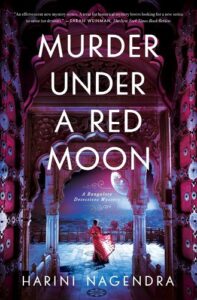From as far back as there were books, writers have interrogated the relationship between past and present. Academic and popular history books help us understand how structures, processes and hierarchies from the past, such as colonization, or slavery, influence our lives even today. Futuristic novels and movies, such as the block buster ‘Back to the Future’, examine other aspects of history through fantasy – pointing out, for instance, how seemingly inconsequential decisions taken in the past can have major consequences for the future.
Historical crime fiction has enduring appeal. It is one of the most popular sub-genres of crime fiction, enticing people to learn about the past while immersed in a lively read. While non-fiction offers a broader canvas to discuss structural themes and minutiae, fiction has an immersive advantage that can pull in many more readers. Novels led the reader steep themselves in the lives and modes of thinking of characters from the past, in settings that are at once familiar and unfamiliar. Same but different.
I’ve always loved historical mysteries, using them as an entry point to learn about worlds and times far removed from my own. As an ecologist and university professor, my day job involves a substantial amount of research into the biodiversity, geography and ecology of Indian forests and cities in the past – putting together evidence from sources as disparate as maps, epigraphic inscriptions, fossil data, and oral histories. When I started writing mystery fiction, it was natural that I would place my novels in the past – in 1920s Bangalore. This is of course the classic Golden Age period that is so popular amongst crime writers and readers. For a story narrative like mine that foregrounds strong women characters, the Golden Age was the perfect time period to help me explore powerful themes that continue to impact us.
My main protagonist, Kaveri Murthy, is a 19 year-old who loves mathematics and has a yearning to solve puzzles and fix injustice in the world around her. In Murder Under A Red Moon, book 2 in The Bangalore Detectives Club series, Kaveri sets out to solve the murder of a powerful mill owner. As she investigates, she finds herself contending with a number of issues that characterized India of the 1920s – women’s suffrage, the exploitation of millworkers, and the burgeoning Indian independence movement.
My favorite way to get introduced to history is through mystery. If I were to list all the historical mysteries I love, the list would run to pages. So I’ve restricted myself to six, in the list below. Some of these may be old favorites. I hope you also discover a few new books and series, which open the doors to old times – and new worlds.
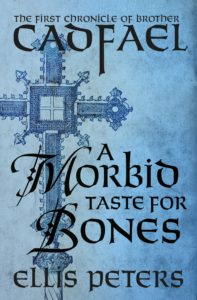
A Morbid Taste for Bones – Ellis Peters
The first in the Chronicles of Brother Cadfael series, this book takes us into the heart of medieval Wales in 1137. When the sacred relics of a revered saint are up for acquisition, there is heated debate. To no one’s surprise, the person most opposed to their removal is found dead. Rumors say that the death was a manifestation of the anger of the saint, but Benedictine monk Brother Cadfael knows it was the work of a live human hand. The Brother Cadfael series transports us to a time and setting that has been relatively under-explored in fiction. Perhaps it’s the ecologist in me, but I find the descriptions of the Benedictine apothecary and their herbal garden, with its medicinal and poisonous plants, especially fascinating. Ellis Peters is the nom de plume of Edith Pargeter, an English writer who wrote both fiction and non-fiction. She had Welsh roots, and like Agatha Christie, she also worked as a pharmacist’s assistant for many years – which may explain her interest in herbal plants and their use (and misuse).
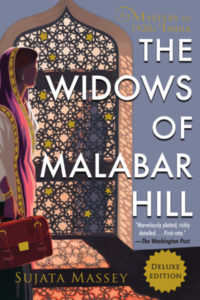
The Widows of Malabar Hill – Sujata Massey
The year is 1921, the location Bombay. Perveen Mistry, a young Oxford-educated Parsi woman who is one of India’s first lawyers, has started out on her career. It is hard to find cases on her own, so she works in her father’s law firm. While processing the will of a wealthy Muslim industrialist, she finds herself bothered by the fact that his three widows have forfeited their rights to his wealth. As a woman, she has the advantage that she can go places that a man will not be allowed – namely, to visit and speak to the women in purdah. When she stumbles upon a murder, Mistry realizes that her suspicions are correct – something dangerous is afoot. Massey is the author of the award-winning Rei Shimura series, set in contemporary Japan. Her Perveen Mistry series is inspired by the path-breaking work of real-life Indian women lawyers of colonial India.
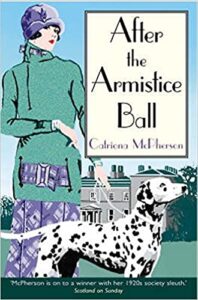
After the Armistice Ball – Catriona McPherson
Dandy Gilver is a bored wife and mother. Her husband, a taciturn Scottish landowner, has just returned home after fighting in World War I, and Dandy is restless at having him afoot again. Her two young boys are at boarding school, and besides, Dandy isn’t exactly what you might call the maternal type. They may be rich in land, but they’re not exactly awash in money – so it’s no small wonder when Dandy jumps at an offer to investigate the mysterious disappearance of an invaluable set of diamonds at her friend’s ball – especially when her friend offers to pay her. But when theft turns into murder, Dandy – accompanied by her delightful sidekick Alex, fiancé of the murdered young woman – must strive uncover the truth. Dandy Gilver is a most untypical sleuth, and the entire series is a delight. McPherson is one of the most atmospheric writers around. Even though you know nothing really terrible is going to happen to the main characters, you find yourself holding your breath as you frantically race through the pages, searching for the ending. Her other mystery series – historical and contemporary – are worth a read too, as are her many stand-alone books.

Her Royal Spyness – Rhys Bowen
Lady Victoria Georgiana Charlotte Eugenie is thirty-fourth in line to the British Crown. But it’s 1932, and she is also penniless, having been evicted from her family home by her obnoxious sister-in-law, and secretly cleaning aristocratic homes in London order to survive. Still, when the Queen asks her to conduct a tiny little task for her – spy on someone – she can hardly refuse, can she? When she finds a dead body in a bathtub, and realizes someone wants her dead – Georgie is in trouble. This is a light hearted, entertaining series with a fresh premise. Bowen is the author of multiple historical mystery series and stand-alone mysteries, each of them a must-read.
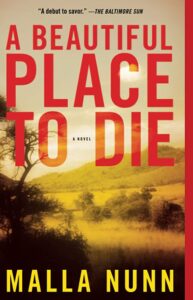
A Beautiful Place To Die – Malla Nunn
Race and skin color are omnipresent, taking on the role of character and setting in Nunn’s novels, set in South Africa of the 1950s, during the height of the tensions around racial segregation, following the implementation of new apartheid laws. Detective Emmanuel Cooper, the main protagonist, is white – as is the murdered man whose death launches the novel, Captain Pretorius – but Pretorius is Afrikaner, while Cooper is white. And the people that the Security Branch of police would like to implicate in the crime are black, communist and radical. But Cooper is not a man to rush to hasty judgement. As he investigates the volatile complex of race, color and ethnicity that make up South African society in the 1950s, the reader gets to learn about the atrocities of apartheid, and to appreciate the ways in which these chasms shape South African society even today. Nunn was born in Swaziland, and her experiences, and those of her parents, shape the issues she writes about. Her work contributes to the growing collection of African voices in crime fiction today.
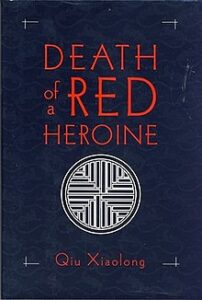
Death of a Red Heroine – Qiu Xiaolong
While not a historical mystery series, strictly speaking, this book is in the list because it takes us to a very different time period. Set in 1990s China, shortly after the Tiananmen Square protests, the book launches a new series that follows the investigations of Inspector Chen. Chief Detective in the elite Special Case Squad, Chen is a gourmand and poet, who has somewhat improbably landed in a job that his gentle literary personality seems ill-suited for. With the help of friends and colleagues, he solves a politically sensitive crime that involves corruption, while also making sure he doesn’t jeopardize his position. Chen needs to keep his job so he can continue taking care of his elderly mother. The series is a fabulous way to get to learn more about life in Chinese cities in the 1990s, with digressions into Chinese free verse poetry and regional cuisines along the way. Xiaolong is an poet and academic who left China and moved to the US after the Tiananmen Square protests, and writes with an insider’s perspective.
***


